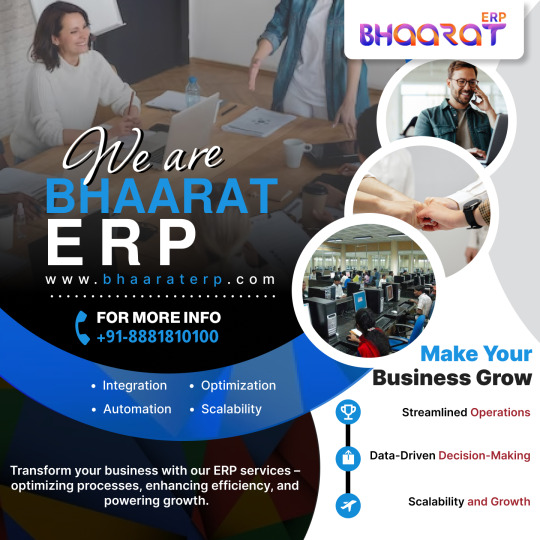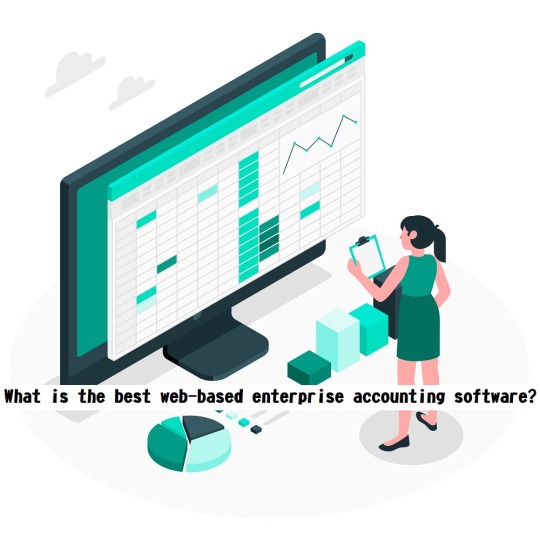#cloud-based erp
Explore tagged Tumblr posts
Text
1 note
·
View note
Text
What is the Best Cloud-Based ERP Software in Saudi Arabia?
For small to medium businesses (SMBs) in Saudi Arabia, finding the right cloud-based ERP system is essential for streamlining operations, boosting efficiency, and managing costs. A standout choice is ALZERP, developed by Al Wajeez Tech, a leading software company based in Jeddah. ALZERP is a modern, affordable, and easy-to-use ERP system designed to meet the needs of SMBs, especially those in…
#ai#business#cloud-based ERP#digital-transformation#erp#saudi arabia#SME#software for small to medium businesses#technology
0 notes
Text
NetSuite Partner Jacksonville
NetSuite Partner Jacksonville
Looking for the best ERP solutions in Jacksonville? As a certified NetSuite Partner, we offer comprehensive cloud-based ERP solutions to help businesses streamline operations and achieve growth. Learn how NetSuite can transform your business today.

0 notes
Text
0 notes
Text
Efficiency at its Best: Exploring Inventory Stock Management Systems in Cloud-Based ERP

In today's fast-paced business environment, efficient inventory management is crucial for the success of any organization. With the advent of cloud-based ERP solutions, businesses now have access to powerful tools that can streamline their inventory stock management processes.
The Rise of Cloud-Based ERP Solutions
Before we dive into the specifics of inventory stock management, let's first understand what cloud-based ERP solutions are and why they have gained immense popularity in recent years. ERP, or Enterprise Resource Planning, refers to a suite of integrated software applications that help businesses manage their core processes, including finance, human resources, and inventory management. Traditionally, ERP systems were hosted on-premises, requiring significant investments in hardware and maintenance. However, with the advent of cloud computing, ERP systems have transitioned to the cloud, offering numerous advantages to businesses.
Cloud-based ERP solutions provide businesses with the flexibility and scalability they need to adapt to changing market conditions. By leveraging the power of the cloud, businesses can access their ERP systems from anywhere, at any time, using any device with an internet connection. This eliminates the need for expensive on-premises infrastructure and allows businesses to focus on their core competencies. Additionally, cloud-based ERP systems offer seamless integration with other cloud-based applications, enabling businesses to create a unified ecosystem that enhances productivity and efficiency.
Streamlining Inventory Stock Management
Now that we have a basic understanding of cloud-based ERP solutions, let's explore how they can revolutionize inventory stock management. Effective inventory management is essential for businesses to meet customer demand while minimizing costs and maximizing profitability. Traditional inventory management systems often suffer from inefficiencies, such as manual data entry, lack of real-time visibility, and difficulty in tracking inventory across multiple locations. This is where cloud-based ERP systems come to the rescue.
Cloud-based ERP systems offer robust inventory management modules that automate and streamline the entire inventory stock management process. These modules provide businesses with real-time visibility into their inventory levels, enabling them to make informed decisions regarding procurement, production, and order fulfillment. By leveraging advanced analytics and forecasting algorithms, cloud-based ERP systems can optimize inventory levels, reducing the risk of stockouts or excess inventory.
One of the key advantages of cloud-based ERP systems is their ability to integrate with other business functions. For example, by integrating inventory management with sales and customer relationship management (CRM), businesses can gain insights into customer demand patterns and align their inventory levels accordingly. This ensures that businesses have the right products in stock at the right time, reducing lead times and improving customer satisfaction.
Conclusion
In conclusion, cloud-based ERP solutions have revolutionized inventory stock management by providing businesses with powerful tools to streamline their processes. With real-time visibility, improved accuracy, optimized inventory levels, enhanced collaboration, and scalability, cloud-based ERP systems offer a comprehensive solution for businesses of all sizes. So, if you want to take your inventory stock management to the next level, it's time to explore the world of cloud-based ERP solutions. Embrace efficiency, embrace the cloud!
0 notes
Text

BhaaratERP Software is the ultimate solution to streamline your business operations. Our cloud-based ERP system provides a comprehensive suite of tools and features to help businesses automate their processes, increase efficiency, and reduce costs. With BhaaratERP, you can manage your inventory, sales, finances, and more from a single platform, giving you complete control over your business. Our software is easy to use, and our team of experts is always ready to support you if you need help. Transform your business today with BhaaratERP Software.
#billing software#bhaaraterp#inventory management#cloud-based erp#gst billing software#public cloud erp solution
0 notes
Text








#enterprise resource planning software#erp usa#erp software usa#best erp software#cloud erp#erp software in usa#cloud-based erp
0 notes
Text
At AQe Digital, we leverage cutting-edge technologies and our 27+ years of extensive experience to deliver goal-oriented digital solutions tailored to industry-specific needs.
✅ 650+ highly skilled professionals driving innovation and excellence.
✅ Industry-focused solutions designed for maximum impact.
✅ Quick collaboration, agile development, and reliable support for seamless execution.
#Digital Product Engineering#Digital Transformation#Enterprise Solutions#Next-gen Tech#Cloud-based ERP solutions#Custom Product Development#Online Retail Solutions#Apps & Integrations
2 notes
·
View notes
Text
1 note
·
View note
Text
What is the best web-based enterprise accounting software?

In the fast-paced and ever-evolving landscape of business, staying on top of your finances is crucial. As enterprises expand their operations, managing accounts efficiently becomes a daunting task. Thankfully, with the advent of technology, businesses now have access to a plethora of web-based enterprise accounting software options to streamline their financial processes. In this comprehensive guide, we will explore the ins and outs of web-based enterprise accounting software, helping you make an informed decision on the best solution for your business needs.
Understanding Web-Based Enterprise Accounting Software
Web-based enterprise accounting software, often referred to as cloud accounting software, is a digital solution that allows businesses to manage their financial activities online. Unlike traditional accounting systems that rely on on-premise software, web-based accounting tools operate in the cloud, offering users the flexibility to access their financial data from anywhere with an internet connection.
Advantages of Web-Based Enterprise Accounting Software
1. Accessibility
One of the primary advantages of web-based accounting software is accessibility. With data stored securely in the cloud, users can access their financial information anytime, anywhere. This proves especially beneficial for enterprises with multiple locations or remote teams, fostering collaboration and efficiency.
2. Cost Efficiency
Web-based accounting solutions often follow a subscription-based model, eliminating the need for costly upfront investments in software and hardware. This cost-effective approach makes it easier for businesses to scale their accounting infrastructure according to their needs without breaking the bank.
3. Real-Time Updates
In the dynamic world of business, real-time data is invaluable. Web-based accounting software provides instant updates, ensuring that users have access to the most recent financial information. This feature is crucial for making informed decisions and adapting to market changes promptly.
4. Automatic Updates and Maintenance
Gone are the days of manual software updates and maintenance. With web-based accounting solutions, updates are automatic, and maintenance is handled by the service provider. This frees up valuable time for businesses to focus on core operations rather than managing software updates.
Features to Look for in Web-Based Enterprise Accounting Software
1. User-Friendly Interface
A user-friendly interface is essential for ensuring that your team can navigate the software seamlessly. Look for solutions with intuitive dashboards and easy-to-understand features to minimize the learning curve for your staff.
2. Scalability
As your enterprise grows, so do your accounting needs. Choose a web-based accounting solution that can scale with your business, accommodating increased transaction volumes and additional users without compromising performance.
3. Integration Capabilities
Efficient accounting doesn't happen in isolation. Ensure that the web-based accounting software you choose integrates seamlessly with other essential business tools, such as CRM systems, project management software, and e-commerce platforms.
4. Security
The security of your financial data should be a top priority. Opt for web-based accounting software that employs robust encryption protocols and follows industry best practices for data protection. Additionally, check for features such as multi-factor authentication to add an extra layer of security.
Top Contenders in the Web-Based Enterprise Accounting Software Market
1. MargBooks
MargBooks Online is a India's popular online accounting solution known for its user-friendly interface and robust features. It offers a range of plans to suit businesses of all sizes and provides tools for invoicing, expense tracking, and financial reporting.
2. Xero
Xero is another cloud accounting software that caters to small and medium-sized enterprises. With features like bank reconciliation, inventory management, and payroll integration, Xero is a comprehensive solution for businesses looking to streamline their financial processes.
3. NetSuite
NetSuite, owned by Oracle, is a cloud-based ERP (Enterprise Resource Planning) solution that includes robust accounting functionalities. It is suitable for larger enterprises with complex financial needs and offers features such as financial planning, revenue recognition, and multi-currency support.
4. Zoho Books
Zoho Books is part of the Zoho suite of business applications and is designed for small and medium-sized enterprises. It provides features such as automated workflows, project billing, and collaborative client portals, making it a versatile choice for businesses with diverse needs.
Making the Right Choice for Your Business
Choosing the best web-based enterprise accounting software for your business requires careful consideration of your specific needs and objectives. Here are some steps to guide you through the decision-making process:
1. Assess Your Business Requirements
Start by identifying your business's specific accounting requirements. Consider factors such as the number of users, the complexity of your financial transactions, and the need for integration with other business applications.
2. Set a Budget
Determine a realistic budget for your accounting software. While web-based solutions often offer cost savings compared to traditional software, it's essential to choose a solution that aligns with your financial resources.
3. Explore Free Trials
Many web-based accounting software providers offer free trials of their platforms. Take advantage of these trials to explore the features and functionalities of different solutions before making a commitment.
4. Seek Recommendations and Reviews
Consult with other businesses in your industry or network to gather recommendations and insights. Additionally, read reviews from reputable sources to gain a better understanding of the user experiences with different accounting software options.
The Evolution of Web-Based Enterprise Accounting Software
As technology continues to advance, so does the landscape of web-based enterprise accounting software. The evolution of these platforms is driven by the ever-changing needs of businesses and the ongoing developments in cloud technology. Let's delve deeper into the evolving trends shaping the future of web-based accounting solutions.
1. Artificial Intelligence (AI) and Automation
The integration of artificial intelligence and automation is revolutionizing how businesses handle their financial processes. Modern web-based accounting software is incorporating AI algorithms to automate repetitive tasks, such as data entry and invoice categorization. This not only increases efficiency but also minimizes the risk of human error.
2. Enhanced Data Analytics
In the age of big data, the ability to derive meaningful insights from financial data is paramount. Advanced web-based accounting solutions are now equipped with powerful data analytics tools. These tools help businesses analyze trends, forecast future financial scenarios, and make data-driven decisions.
3. Mobile Accessibility
The shift towards mobile accessibility is a notable trend in web-based enterprise accounting software. Businesses are increasingly relying on mobile devices for day-to-day operations, and accounting software providers are responding by offering mobile-friendly applications. This allows users to manage their finances on the go, providing unparalleled flexibility.
4. Integration with E-Commerce Platforms
As e-commerce continues to thrive, businesses are looking for accounting solutions that seamlessly integrate with their online sales platforms. Modern web-based accounting software often includes features tailored for e-commerce, such as automated transaction reconciliation with online sales channels and inventory management.
5. Blockchain Technology
Blockchain technology is making waves in various industries, and accounting is no exception. Some web-based accounting solutions are exploring the integration of blockchain for enhanced security and transparency in financial transactions. This could revolutionize how businesses handle aspects like auditing and transaction verification.
Common Challenges and How to Overcome Them
While web-based enterprise accounting software offers numerous benefits, it's important to be aware of potential challenges and how to overcome them. Here are some common issues businesses may face:
1. Security Concerns
The sensitive nature of financial data raises concerns about security in the cloud. To address this, choose a web-based accounting solution that employs robust encryption protocols and complies with industry security standards. Additionally, educate your team about best practices for secure online behavior.
2. Connectivity Issues
Reliable internet connectivity is crucial for accessing web-based accounting software. In regions with unstable internet connections, businesses may face challenges in real-time collaboration and data accessibility. Consider implementing backup solutions for offline access or explore accounting software with offline capabilities.
3. Customization Needs
Every business has unique accounting requirements. Some businesses may find that certain web-based accounting solutions lack the level of customization they need. In such cases, explore platforms that offer extensive customization options or consider integrating additional specialized accounting tools.
4. Data Ownership and Control
Understanding the terms of service and data ownership is essential when using web-based accounting software. Ensure that the chosen platform allows you to retain control over your financial data and provides mechanisms for data export in case of migration to a different system.
Conclusion: Making the Right Choice for Long-Term Success
In the fast-paced world of business, the right web-based enterprise accounting software can be a game-changer. Whether you're a small startup or a large enterprise, the key is to stay informed about the latest advancements in accounting technology and align your choice with the long-term goals of your business.
As you navigate the vast landscape of web-based accounting solutions, remember that the best choice is the one that seamlessly integrates with your business processes, enhances efficiency, and adapts to the evolving needs of your enterprise. If you have any specific questions or need further guidance on a particular aspect of web-based accounting software, feel free to ask for more information!
Also read- Online billing and accounting software to manage your business
#Web-based accounting#Cloud software#Financial management#Enterprise solutions#accounting#software#billing#online billing software#technology#programming#erp#tech#drawings#illlustration#artwork#art style#sketchy#art#aspec#aromantic asexual#arospec#acespec#aroace#aro#bg3#astarion#shadowheart#gale dekarios#gale of waterdeep#karlach
2 notes
·
View notes
Text

How ERP System Is Changing The Current Education Scenario?
In the technology ruled through digital transformation, the training zone is swiftly embracing generation to streamline its procedures, decorate conversation, and improve standard institutional efficiency. One of the most enormous shifts is the adoption of Enterprise Resource Planning (ERP) systems tailored for instructional institutions. These structures are now not simply gear for dealing with facts as they may be reshaping the way schools perform, communicate, and evolve.
https://iycworld.net/how-erp-system-is-changing-the-current-education-scenario/
#Best school ERP software#Cloud-based school management system#School ERP with mobile app#All-in-one school management software#Customizable ERP for educational institutions
0 notes
Text
ERP for Manufacturing Industry for Streamlined Operations
In today's fast-paced and competitive environment, manufacturing companies must constantly optimize their operations to remain profitable and relevant on the market.ERP for Manufacturing Industry can be used to improve productivity and streamline workflows in the manufacturing industry.
ERP software is used to integrate different functions within an organization into a single platform. Manufacturers must therefore bridge the gap between production, sales and supply chain in order to create a complete operating framework.
This article will discuss how manufacturing ERP software can revolutionize business operations. In addition, we will discuss ERP software for manufacturing, production ERP software, and supply chain management ERP Software as well as the most suitable ERP software to meet the modern manufacturing needs.
Why ERP in manufacturing is important
Manufacturing faces unique challenges. Manufacturing faces unique challenges.
Benefits of ERP for manufacturing:
Better production planning - Real-time insights into raw material availability, schedules of production and other factors helps to minimize bottlenecks.
Improved inventory management: Automated tracking ensures optimal levels of inventory and reduces waste.
Better data visibility: Centralized dashboards give decision makers actionable data.
Cost reduction By eliminating inefficiencies, ERP reduces costs.
Quality control: Integrating QMS (Quality Management Systems) ensures compliance with standards of quality.
Features and Benefits of ERP Software for Manufacturing Industry
Software for Manufacturing Industry provides modules to cover all stages of the production life cycle. The ERP software simplifies workflows, from order fulfillment to procurement.
Features include:
Production Scheduling Allows managers to plan and optimize production activities.
Inventory and warehouse management. Tracks materials in real time.
Procurement management: Automates vendor interactions and purchase orders.
Financial management: Maintains accounting data and budgeting related information for operations.
CRM: Facilitates customer communication.
Quality Control & Compliance: Ensures all products meet regulatory standards.
Manufacturers who wish to stay competitive must invest in software that is advanced and up-to-date.
Production ERP software: Increasing efficiency
Production Enterprise Resource Planning Software is designed to manage the complexity in manufacturing operations. This software integrates all aspects of production, from planning and scheduling to monitoring and quality control.
Production ERP Software:
Real-time production monitoring: Tracks employee performance and machine performance.
Reduced downtime: Predictive maintenance ensures machinery runs efficiently.
Resource optimization: This ensures that labor, materials, and time are used efficiently.
Cost Control: Reduces operating costs through elimination of redundant activities.
By leveraging, ERP can help manufacturers improve quality and reduce lead times. They will also be able to increase customer satisfaction.
Project Planning and Software Project Management
Planning is an important part of software project management . It involves setting goals and timelines, and allocating resources efficiently.
Steps to successful ERP Project Management:
Requirement Analysis: Identify your specific manufacturing process needs.
System selection: Selecting the best software to suit your business model.
Team training: Train your employees how to use the system.
Test Run tests to ensure the system performs as expected.
Continuous improvement: Regular updates and evaluations ensure the ERP remains effective.
Supply Chain Management in ERP
An effective manufacturing process will not be complete without an ERP supply chain system. The ERP supply chain integration integrates logistics, inventory and vendor management.
The benefits of ERP software in supply chain management:
Real-time visibility: Gain insights into inventory levels and supplier performances.
Demand forecasting: Use historical data to predict demand and plan production.
Better vendor relations: Reduced delay due to improved communication with suppliers.
Savings: Optimise purchasing and logistics to lower costs
When supply-chain ERP software is implemented correctly, finished products and raw materials will flow smoothly through the manufacturing process. This reduces disruptions.
Project Management Software for Manufacturing
Project management software for manufacturing tracks tasks, ensures timely delivery and organizes them.
Features include:
Gantt charts for visual project timelines.
Allocation tools
Budgeting, cost tracking and
Team Collaboration Features
Real time analytics and reporting
Companies can increase their efficiency and productivity through the combination of ERP software designed for the manufacturing industry with robust project management tools.
Best ERP software for Manufacturing Industry
In the manufacturing industry, these are the most common solutions:
SAP businessOne: Ideal for mid-to-large manufacturers
Odoo : Open source ERP system with high customization.
Microsoft Dynamics 365 Compatible Microsoft tools and services.
NetSuite - the best cloud-based ERP system.
TallyPrime - Excellent for Small and Medium Businesses
How ERP can streamline manufacturing operations
The implementation of ERP software for the manufacturing industry is crucial to transforming how businesses run.
Automate repetitive tasks like order processing and inventory control.
Real-time reporting for quick decision-making.
Seamless integration between sales, production and finance
Enhanced compliance through automation of documentation and reporting
ERP production ensures every department works together, eliminating data silos.
Future Trends in ERP Manufacturing
Smart ERP systems are used by manufacturers for:
Sensors can be used to monitor equipment's health.
AI-powered predictive analytics is a powerful tool.
Cloud-based solutions let you access ERP data anywhere.
The real-time tracking and management of orders improves customer satisfaction.
The ERP system is becoming smarter and more capable of adapting to the demands of modern manufacturing.

Conclusion
ERP software is a powerful tool for the manufacturing industry. It can be used to improve operational efficiency, cut costs, and boost productivity.
The future for manufacturing lies in adopting the best ERP software that not only adapts industry trends, but also meets the current needs. ERP software is a powerful tool to help manufacturers gain greater agility, improve decision-making, and gain a competitive edge in the marketplace.
#ERP for manufacturing industry#ERP software for manufacturing industry#production ERP software#ERP for production#supply chain management ERP software#project planning in software project management#project management software for manufacturing#supply chain management in ERP#supply chain management software#best ERP software#manufacturing ERP solutions#cloud-based ERP for manufacturing#manufacturing software#ERP implementation for manufacturing#ERP systems for production
0 notes
Text
Revolutionizing Retail Operations in the UAE with Smarter Solutions
Businesses in the UAE are rapidly evolving, and modern retail demands smarter, faster, and more efficient solutions to meet customer expectations. Whether it's a small boutique or a large franchise, staying competitive requires tools that go beyond traditional methods. This is where digital transformation plays a vital role, and leading this wave of change are providers like Ontech Systems Dubai.
Why Businesses Are Switching to Smart Retail Management
Retailers are increasingly turning to intelligent platforms that offer real-time data, inventory synchronization, remote access, and advanced analytics. Traditional systems no longer meet the needs of fast-paced, multi-location businesses. With today's challenges — from managing customer flow to tracking stock levels accurately — automation and cloud integration are no longer optional; they're essential.
The UAE Market's Growing Demand for Real-Time Control
Dubai, being one of the most technologically progressive cities in the region, has become a hub for businesses seeking reliable and flexible retail solutions. Companies are choosing providers like Ontech Corporation Dubai for their ability to implement systems that offer seamless control over day-to-day operations, whether on-site or remotely.
Features That Drive Growth
What makes modern platforms appealing to UAE-based businesses?
Multi-location support: Control several branches from one centralized dashboard.
Inventory automation: Reduce human errors and maintain accurate stock levels.
Integrated payments: Handle multiple payment methods, including digital wallets.
Customer insights: Understand purchasing behavior and tailor loyalty programs.
Cloud accessibility: Monitor sales and performance from anywhere, any time.
These features are not only increasing productivity but also enhancing customer experience — a key factor in retaining loyal clients.
Choosing the Right Technology Partner in Dubai
When selecting a solution, businesses often look for a partner that understands local market dynamics and offers dedicated support. Ontech Systems Provider Dubai stands out by combining global expertise with local service, delivering systems that are tailored to the needs of retail, F&B, and service industries in the UAE.
From implementation and staff training to round-the-clock support, their commitment to client success ensures businesses get the most out of their investment.
#ontech system in dubai#Cloud Based Pos software in UAE#cloud based hrms dubai#cloud based hrms uae#erp software in dubai#ontech soultion in dubai
0 notes
Text
What Is Cloud ERP Software And How Does It Work?

What is cloud ERP?
Cloud ERP, or enterprise resource planning, is a cloud-based software system for managing finances, inventory, and other critical activities. ERP software streamlines and automates critical business procedures, allowing you to run your operations more efficiently. To succeed in today’s highly competitive business world, organizations require cutting-edge technology that enables them to innovate and scale rapidly.
Businesses require a digital transformation that can only be achieved by being globally connected, advanced, and competitive by prioritizing software system and tool updates, rapid access to real-time data, and applying diverse growth strategies. This is where cloud-based ERP software and its advantages come into play. In particular, cloud ERP software may help you manage finances, such as invoicing, financial reporting, and budgeting. Cloud ERP software can also help you maintain track of inventory levels, ensuring you have enough to meet client demands.
How does cloud ERP work?
Cloud ERP solutions operate similarly to on-premise ERP systems, with the primary distinction being that they are hosted off-site, usually by the software vendor. You don’t have to invest in their hardware and infrastructure to run the software, which makes it more affordable.
The term “cloud” refers to a collection of internet-connected technologies such as storage, servers, networking, and software. Cloud-based ERP solutions typically need organizations to cover a recurring charge to access the software. This can make it more flexible for enterprises because they only pay for what they use and can increase or decrease their usage as needed. Businesses can also access their data from anywhere with an internet connection, which is advantageous for remote work.
A cloud-based ERP platform’s primary capabilities include access to customer information, financial data, human resource management tools, sales history, supply chain management, and many other features.
In this blog, we will see the Cloud ERP Features, Benefits, and How PMTRACK Cloud ERP Helps for the manufacturing companies in Pune to grow their business.
Cloud ERP vs. On-Premise ERP
Cloud ERP operates on an external cloud computing platform and is maintained by the vendor’s IT team. On the other hand, on-premise ERP is deployed on your servers and hardware and maintained by your in-house IT team.
Features of Cloud ERP
As a business owner, you must be concerned with numerous tasks. You must consider the product or service you provide, your customers, your employees, and your bottom line. When it comes to ERP, you should examine the initial cost, implementation time, and whether your employees can use it. Cloud ERP systems often have the following features:
Ease of use
The ERP system should be simple to use so that your staff can rapidly understand and implement it. The cloud ERP system should have an easy-to-use interface and offer users the training and assistance they need. Companies that supply cloud ERP systems frequently give free or low-cost training to help business owners and staff get the most out of their systems.
Flexibility
Cloud ERP systems are often more adaptable than on-premise ERP solutions. Some cloud ERP solutions include a “pay as you go” pricing model, which is beneficial for firms with changing or seasonal needs. Cloud ERP solutions can also be scaled up or down to match changing business requirements.
Accessibility
Cloud ERP allows you and your staff to use the system from anywhere with an Internet connection. This can improve the workflows of your remote or regularly traveling personnel. For project management, some cloud ERP solutions have mobile apps that allow users to access the system while on the go.
Customizations and integrations
Most cloud platforms enable some level of customization and integration. You can choose the features and modules that best suit your requirements. For example, you may only want the accounting and inventory management capabilities of an ERP system. Some cloud ERP providers include pre-built interfaces with popular business programs like QuickBooks, Salesforce, and Google Apps.
Security
Business owners frequently express concerns about security when it comes to cloud computing. However, cloud ERP providers often use strong security features such as data encryption and user authentication. Always check with a potential provider to discover what security precautions they have in place. Cloud-based ERP solutions can give your company more security and peace of mind.
What are the Benefits of Cloud-based ERP?
Cloud-based ERP systems provide several potential benefits that might entice enterprises of any size. These solutions can help you streamline your operations, improve accessibility, and find cost-saving options. Advantages include:
Ease of Implementation: Cloud ERP systems are quicker to adopt than on-premise ERP systems. The technological environment for cloud technologies can be set up in as little as 24 hours.
Scalability: One of the most appealing aspects of any cloud-based ERP is its capacity to scale effortlessly as a company’s requirements evolve. Upgrading and scaling an on-premise system requires a significant amount of time and effort.
Mobility and Access to Information: Mobile devices are now firmly established as crucial business tools. On-premise ERP software has been reluctant to adapt to the mobile world, but cloud-based software enables advanced access and control via ERP-enabled mobile devices.
End User Adoption: Cloud technology frequently includes current user interfaces that make it easier to adapt than on-premise software, thus employees may be more willing to accept software changes.
Regular Upgrades: Cloud-based ERP deploys software updates from the manufacturer’s or vendor’s cloud servers, relieving IT staff of the responsibility of regularly updating the system.
How PMTRACK Cloud ERP Solution Helps:
PMTRACK Cloud ERP software can offer several advantages to enterprises of all sizes and sectors. Cloud-based ERPs can help businesses streamline their operations and achieve higher efficiency and profitability by lowering upfront costs and facilitating speedier adoption, as well as improving scalability, accessibility, and security.
We understand the hurdles that organizations encounter while integrating new technology solutions. That’s why we provide complete cloud-based ERP implementation services that can assist organizations of all sizes in optimizing their operations and achieving their strategic objectives.
Our expert consultants and engineers can assist you with selecting the best cloud-based ERP software for your business, implementing the solution quickly and efficiently, and providing ongoing support and maintenance to ensure that your system remains up to current and functioning properly.
Businesses that work with PMTRACK ERP may use the power of Cloud ERP software to accelerate growth, enhance efficiency, and remain ahead of the competition. So, if you want to take your business to the next level, call us today to learn more about our cloud-based ERP services and how we can help you reach your objectives.
Bottom Line:
Cloud-based ERP systems are a sophisticated and proven solution used by thousands of companies all over the world to achieve digital transformation.
Businesses that select cloud ERP services can accelerate their growth efforts since they have immediate real-time access to data and tools that can drive change, allowing them to capitalize on opportunities in the fastest ways possible.
Now is the moment to start using a cloud ERP solution. Our objective is to empower businesses by utilizing cloud-based ERP technologies. Contact us today to discuss your business needs and begin the journey to digital transformation.
Contact us to set up a demo or learn more about how PMTRACK ERP Software can help you streamline your business operations.
To summarise, cloud-based manufacturing ERP solutions in Pune provide compelling benefits for small firms, such as cost savings, simplicity of setup, scalability, and end-user engagement.
However, it is critical to consider potential negatives such as data security problems, customization restrictions, and cost. By researching both the benefits and potential pitfalls of cloud-based ERP, you’ll be able to make an informed decision for your company.
0 notes
Text
Integrating Cloud-based ERP with CRM for Enhanced Customer Service
Integrating cloud-based ERP with CRM systems offers businesses a range of benefits, from streamlined processes and improved customer service to increased efficiency and productivity. By leveraging the power of integration, businesses can gain a competitive advantage and deliver exceptional customer experiences. However, it is essential to consider compatibility, customization, data migration, training, and security to ensure a successful integration. With the right approach and careful planning, businesses can enhance their customer service capabilities and drive growth in today's digital age.
0 notes